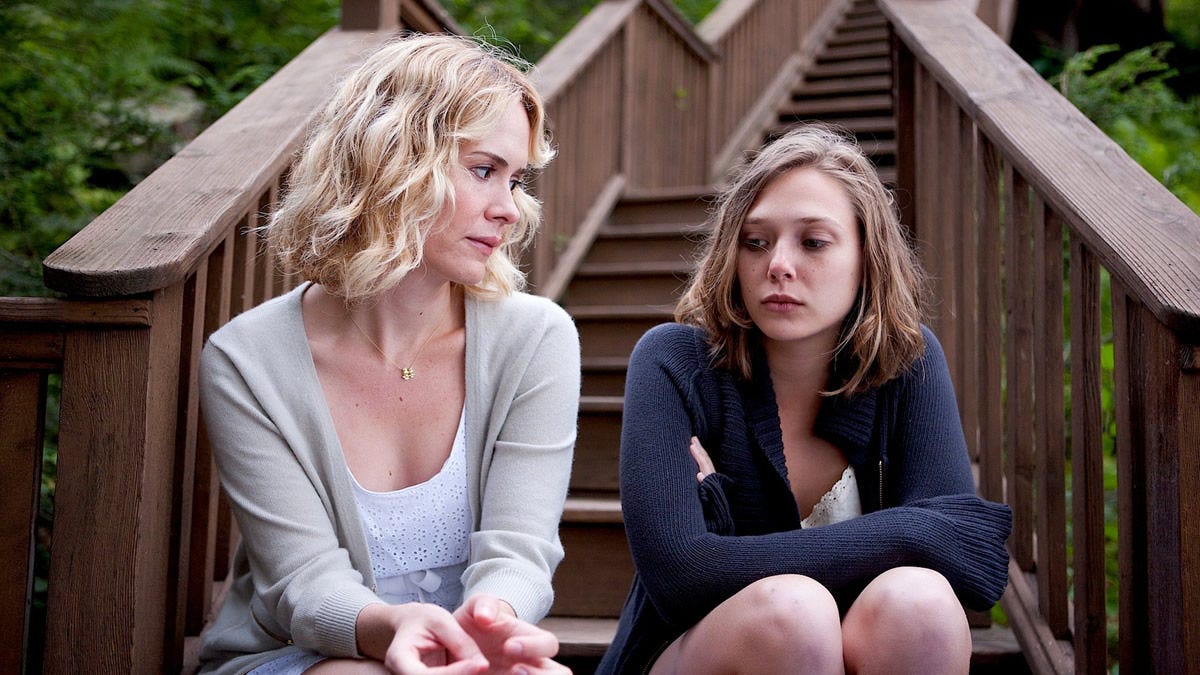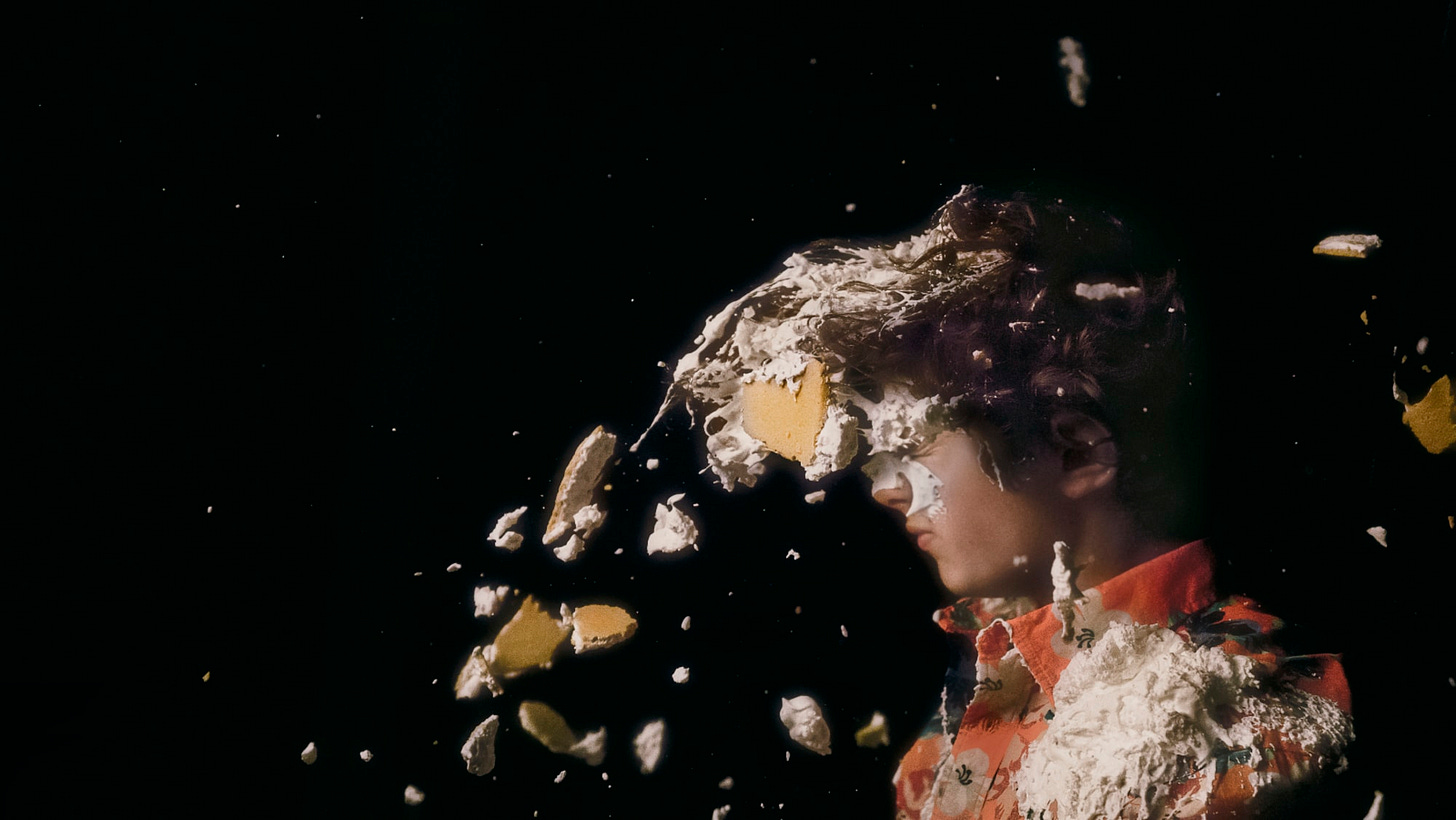Issue #40: Finding Reality 💿
Martha Marcy May Marlene + Honey Boy
I feel like every time I come to write one of these my mind starts with “it’s been a week ™️", but this time it has been an immensely hard one on so many levels. Before we get into anything else, I’d like to encourage you to throw whatever resources you’ve got into Asian American community resources, following this week’s act of terrorism.
For Issue #40 we’re focusing on films where reality feels misaligned, and struggling to find any answers just leads to more questions, confusion, and anger. Zosha revisits Martha Marcy May Marlene, and the shadowy truths lurking within it. Then we’ve got Cate on Honey Boy, and the warped world it represents. Hang in there, read on, and we’ll see you next week.
Zosha on Martha Marcy May Marlene
There are certain movies that linger in the recesses of your mind, more a feeling memory than a vivid one. That is how Martha Marcy May Marlene, a feature I saw in my early reviewing days, sat for me. Almost 10 years ago, I sat in a dark theater with my mom (hi!) watching a wholly different movie than I had thought (and likely a different one than I sold her on). Rereading my review, it’s quiet; I didn’t know what to say, and I highlighted the slow play of Martha, emphasizing how it steadily unfurls into something greater, messier, with more teeth bared than I initially thought.
Revisiting it years later, I am struck by the gray area of it all. Almost a decade later we’ve seen new epochs come and go, our world turn upside down so many times it’s not hard to imagine we’re somersaulting into oblivion. Martha Marcy May Marlene, as brief a window as it is, feels prescient in this way. As we watch Martha try to steady herself in the two weeks after she’s escaped from an abusive and murderous cult, she is completely unsure of what to trust. What is right feels wrong, or else has never suited her at all.
Director Sean Durkin is constantly toying with these elements. When Martha is in doubt he amps up the contrast, inflaming every ounce of shadow on the screen. It’s only when she’s sure of herself does she feel well lit, bathed by light. Of course, those scenes don’t follow a tidy pattern — usually, it’s when she’s isolated and safe, either on the boat with her family or swimming in the lake. But he pulls the same stunt when she has a panic attack at the party, accusing the bartender of having followed hundreds of miles from the farm in an attempt to lure (or kidnap) her back. As she kicks, screams, curses, flails, and begs, there is almost no darkness on the screen; it’s only once her family has sedated her that the slowest fade out of all-time starts consuming the frame.
I remember Martha Marcy May Marlene feeling much more set in my mind than the film turned out to be on rewatch. The entire final stretch is different in my mind, plainer—or perhaps less. What has always lingered with me most (beyond the recollection of watching the assault scenes next to my mom, knowing that I had been the movie picker) is how murky the actual story is. Through Durkin’s script and Elizabeth Olsen’s acting, we are given just enough to believe either a break from reality or a deeper understanding is possible. It’s not that the doubting scenes are dreamlike—in fact, their intrinsic groundedness only aids the mystery of it all. That final swim in the lake feels like she’s awake, the question only being whether she’s seeing someone who’s actually there. It’s a puzzle, one clearly intended to be without a clear answer, and its lack of tilting too far any one way is the most fun of all. But the facts we know (the phone call she makes to “Marlene,” the neighborhood she’s found herself in, the desperation of her former cultists) only add to the enigma of the man by the lake and the car by the road.
What makes Martha feel so strong to me on this rewatch is the glimmer of hope afforded to her. I can’t quite source it, but it feels like it’s almost completely borne of Olsen’s performance. One way or another, by the end of the film, Martha knows she’s going to be ok. It’s a small blessing, but one that imbues something more powerful to the film than it might otherwise have. It’s a bad two weeks, a terrible chapter in her life. But somehow, she’s moving on. May we all be so lucky.
Cate on Honey Boy
Last Sunday, HBO’s four-part docu-series Allen v Farrow concluded with an episode documenting the public response and fallout after Dylan Farrow—daughter of actress Mia Farrow and director Woody Allen—publicly reaffirmed her allaegations of abuse against her father for the first time as an adult. In total, the series was expansive and thorough. Weighted of course by Dylan and Mia’s participation, it offered a counter-narrative to the one that Allen crafted so carefully all those years ago—that Mia was jealous and vengeful and had brainwashed his child against him.
That narrative comes to mind as I worked through Shia LaBeouf’s semi-autobiographical film Honey Boy. Written by the actor during a stint in rehab, it chronicles the abuse he endured at the hands of his father as a youg child star, and the anger and addiction problems he was saddled with as an adult. La Beouf stars as his own father, rounding out the cast of Lucas Hedges and Noah Jupe as his younger and older selves. The film is nakedly a story about trauma, and how abuse reverberates through generations.
At the time of its release in 2019, Honey Boy was received as a mea culpa of sorts—an explanation for the increasingly erratic and dangerous behaviour from a man who had once been a bright young star. “This is why,” the story seems to say, “I never had a chance.” And the gambit almost works. In a review for Buzzfeed, reporter Scaachi Koul wrote:
“[b]ut LaBeouf now appears eager to take responsibility for his own behavior by publicly interrogating his trauma. The timing is pretty perfect; while the rest of us are grappling with what bad men leave in their wake, he is giving an explanation for his behavior from the very beginning.”
There’s nothing better in Hollywood than a redemption arc, and LaBeouf gave us one. Here was his trauma served on a silver platter, readied and prepped for our entertainment.
But a redemption arc only works if you stay redeemed, and Shia did not. In December of 2020, news broke that singer FKA twigs, who also stars in the film, was suing LaBeouf for sexual battery, assualt and infliction of emotional distress. Her account detailed a terrifying array of violence, much of it perpetuated during the filming and promotion of this very film.
In that way, the movie is a magic trick. A public display of contrition masking a private regression into abuse, made all the worse by the effusive apologies that came before. LaBeouf has been “owning up” to his behaviour for years now, but never once has he completed the crucial step of changing it. And all of that is in the film, laid out for audiences to see in his own impeccable performance in the film.
Because make no mistake, the film is excellent. LaBeouf’s script is tight. He bounces between two timelines, reckoning with his violent present and his small, abusive past. Jupe’s portrayal of his 12-year-old proxy Otis is heart-wrenching. He is verbally and physically abused by a man who should be protecting him. Otis’ guarded openness is tragic because it is so naive. But how can you blame a child for wanting to be loved? How do you impress upon him that an adult’s choices are not his responsibility? Hedges also shines in his scenes, embodying LaBeouf’s well-known physical ticks and aggressiveness. He saunters uncannily, fully inhabiting the familiar gait.
But in light of these new allegations, one has no choice but to see this film as what it is—another false apology. Beautiful as a it is, Honey Boy is a distraction from the man who made it. A deliberate act of self-flaggelation intended to sidestep accountability.
How is it any different than a lauded director constructing an entire reality in order to excuse his own predation?
Assorted Internet Detritus
ZOSHA: To be fully transparent, I did not read a lot this week (I’m “at” SXSW so it’s been non-stop movies/work). But I did love this look at the ecstatic trippiness of theater carpets, and this old profile/review of Haim’s best album. Plus last week I published a thing (also related to MMMM) on Elizabeth Olsen and a guest podcast spot!
CATE: This is your brain on Peleton, why you’ve been buying so much merch, how “shithole colour grading” is making you a little racist, SNL as a path to the Oscars, what’s become of millennial pop, Bachelor race fails, why Queen Latifah is the queen of romcoms, and 61 ways to donate in support of Asian communities.
Zosha + Cate <3
twitter: @30FlirtyFilm
instagram: @30FlirtyFilm







